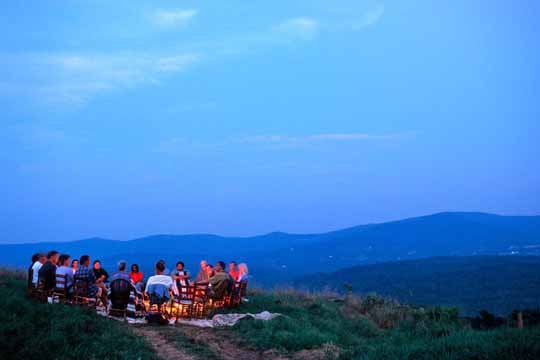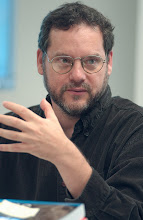 From July 17 to July 23, 2008, I took part in a six-day "Whole Thinking Retreat" sponsored by the Center for Whole Communities at Knoll Farm in Fayston, Vermont. The twenty-plus participants and facilitators were a multi-racial group of environmental leaders from across the country trying to move beyond the limited thinking so often embedded within each of our particular sectors of the movement. My cohort now joins over 700 other alumni of similar Center retreats. The reflections below are adapted from some journal writing I did upon returning home.
From July 17 to July 23, 2008, I took part in a six-day "Whole Thinking Retreat" sponsored by the Center for Whole Communities at Knoll Farm in Fayston, Vermont. The twenty-plus participants and facilitators were a multi-racial group of environmental leaders from across the country trying to move beyond the limited thinking so often embedded within each of our particular sectors of the movement. My cohort now joins over 700 other alumni of similar Center retreats. The reflections below are adapted from some journal writing I did upon returning home. Driving home from Knoll Farm reminded me of the last scene in
My Dinner With Andre. In that movie, Wally Shawn is driving home in a cab through the streets of New York City--something he's done countless times before--and he is staring out the window transfixed, seeing everything again for the first time and with appropriate awe. All of life was sacramental to him after his amazing dinner with his friend.
That was also true for me during my quiet trip home through the sometimes cloud-hidden and rainy Green Mountains and hills of Vermont. I drove in silence (without my usual talk radio jabbering on and on) at 55 miles per hour--ten miles an hour less than the speed limit, and twenty-five miles an hour less than I usually drive. Not changing lanes, not passing anyone, and burning far less gas on this trip, I had time to look out the window more, to notice my breathing, to think deeply about my time at Knoll Farm and about all of my companions on the retreat journey, including the luminous green humming bird I saw in one of the flower gardens during one of the few sunny moments in the week.
In Jewish Scripture, the word for "sin" literally translates to the phrase "missing the mark." At the Farm, I tasted "the mark" with unusual vividness. I tasted being a part of a diverse, inspiring, and intentional community working to create a more environmentally sustainable, spiritually fulfilling, and socially just human presence on this planet.
For five of our days together, we walked up and down Bragg Hill--or rode in the "sun buggy"--though the Farm's gardens, grasslands, and woods. At the top of the hill, we sat in a circle in a giant yurt and shared our core visions and values and--very blessedly--took the time to talk honestly about race, power, and privilege in our lives and in our organizations. We did this even when it was painful, incomplete, and raw. All of us experienced moments of anger, hurt feelings, and misunderstanding in that yurt--as we sometimes did during the rest of our time together at Knoll Farm. Yet, we also shared many moments of profound forgiveness, repentance, and insight. We became imperfect, but powerful, allies during those six days.
Our time together also fed my tattered, middle-aged, Quaker soul. We spent from ten at night to ten in the morning in silence. We even meditated together several times during the "talking" part of our day. We told stories about our lives and about our work back home to help heal the world. There was one night of ecstatic dancing and chores everyday, as well as hot, outdoor, solar-heated showers early in the morning, sometimes taken in the rain. I mulched and picked blueberries, sorted wool, or shucked peas most afternoons. There was singing sometimes while we worked or did spoon carving--and some people read poetry before dinner. Don't even get me started about the food! There were also giant orange moons coming up over the mountains at least partially visible through the clouds to the southeast most every night. These moons were most frequently viewed from a fire circle where several people sat a while before heading off to sleep in their tents.
I found it hard to say goodbye to everyone at the Farm and drive home on our last morning. Yet, as well as one can driving alone in a car powered by gas and lubricated by oil, I came much closer to the mark than normal on that journey home. Inside that car, I drank water from the Farm that I carried in the metal bottle that I now usually keep clipped to my belt loop. On such a trip in the past, I would have stopped along the way and purchased six or seven plastic bottles of diet soda.
I also got hungry for lunch near Randolph and took the town's exit off Interstate 89 and drove right past the McDonald's at the end of the ramp. Usually, driving alone and with no one looking, I would have turned into that parking lot and indulged in some childhood/teenage comfort food, one of my private guilty pleasures that has had a huge addictive pull on me for decades. On this afternoon, however, McDonald's did not hold any allure or offer any pleasure to me. It was not just far from the mark, it was also far from my heart.
Instead, I drove into town and looked for a little, locally-owned restaurant that served me a handmade salad with a bit of chicken, a hard boiled egg, and some diced black olives on top of a mix of greens, romaine lettuce, tomatoes, cucumbers, peppers, and carrots all lightly dressed in olive oil and balsamic vinegar. The Depot Restaurant owner brought it to me with a smile, along with a slice of homemade bread, and all of it in a glass bowl!
I ate slowly thinking of the single wooden bowl that I had eaten out of every meal for a week, the very bowl that was now sitting cock-eyed on the front seat of my borrowed car. I also thought of Helen and Jay, two long-time organic farmers that I now knew personally. I silently lifted my glass of local tap water and toasted them for their love of our soil and their ability to help the earth say beans or squash or blueberries.
I only wished that the owner had stood by the table before I ate and told me what farm every ingredient in the salad had come from. I also fantasized about someone standing up at the next booth and reading a poem by Rumi out loud and then another customer on the other side of the room offering a few passages from Wendy Johnson's Gardening at the Dragon's Gate. Gently letting go of that sweet image, I offered a silent prayer before I ate my lunch. "Stealth meditating" Wendy would call it.
Driving homeward again, I felt Dunking Donuts, Burger King, even the Olive Garden slipping away from me. As I munched one-handed on Knoll Farm organic blueberries for my dessert, I felt myself drawing closer toward the mark--closer toward farmers markets, roadside produce stands, locally-owned restaurants, and the organic section of my big chain supermarket until those precious folks in Keene, who are working on establishing a food coop in our town, succeed. And, yes, I thought I should send them a little money and a thank you note, right after I send a thank you poem to all the dear ones from my retreat week at Knoll Farm.
When I finally arrived in Keene, I picked up my computer from work and drove straight to my house, unlocked my backdoor--I hadn't had keys in my pocket for five days, let alone a computer nearby--and I began to put my stuff away. I laughed at a week's worth of unread newspapers dutifully piled on the dining room table by my partner Katy and I checked to see if there was any mail for me that had arrived while I was gone. I only opened one piece--the invitation to the upcoming September weekend celebration of the Center for Whole Communities' fifth year anniversary at Knoll Farm.
I drank some water from my own kitchen faucet and got back in my borrowed car to fill up its tank at a Citgo station--whose profits at least help some of the poor in Venezuela. I then returned the car to my friend and, by way of a small thank you, gave her my last unmolested box of Knoll Farm blueberries. She was thrilled. We hugged, chatted a bit, and then she offered me a ride home. Even with it threatening rain again, I said no.
Like my four hour drive home, I walked this final bit as Wally Shawn rode home in his cab--in my case, wide-eyed and delighted while walking by our Town Common, which sits across from City Hall and the big white United Church of Christ, then on down our Main Street dotted with small businesses on either side, past the Colonial Theater (an amazing nonprofit arts organization), and up the hill on Water Street to my little house surrounded by Katy's flowers. Walking through my community, I felt more committed than ever to fostering creative citizen action for climate protection, ecological sustainability, social justice, and the democratic control of corporations.
Still, on this day, I just sat quietly looking forward to Katy returning from work and hearing all about her week. I imagined her as a double rainbow over the Mad River Valley and waited.
 The first ripple is that EAOP professor Abigail Abrash Walton's article, which was recently published in the journal Environmental Management, is now available online. The piece -- which is based on the talk that Antioch University New England's Center for Tropical Ecology and Conservation invited her to present at their 2004 symposium -- is entitled “Conservation through Different Lenses: Reflection, Responsibility, and the Politics of Participation in Conservation Advocacy.” If you want to have a look, you can access the paper here.
The first ripple is that EAOP professor Abigail Abrash Walton's article, which was recently published in the journal Environmental Management, is now available online. The piece -- which is based on the talk that Antioch University New England's Center for Tropical Ecology and Conservation invited her to present at their 2004 symposium -- is entitled “Conservation through Different Lenses: Reflection, Responsibility, and the Politics of Participation in Conservation Advocacy.” If you want to have a look, you can access the paper here. 




